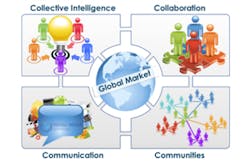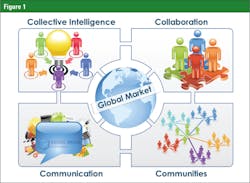Social media is essentially a sharing experience happening online, and the latter phenomenon has made way for four main cost-effective business opportunities that the water industry can take advantage of as much as any other industry (see Figure 1).
Communication
Social media allows for increased and more efficient communication, both internally within the same company as well as externally between different companies. Communication via social media transcends geographical barriers, making it possible for two key players to communicate even if countries are apart, but also offers different ways to communicate through different social media platforms.
GoToWebinar, for example, is a do-it-yourself (DIY) tool that can be used by water professionals to create online seminars for others to view in order to explain a certain operation, a series of operations or any other activity related to their business. These seminars can be made available to 1,000 people at the same time, regardless of geographical barriers. Another useful social media tool for communication is YouTube, a video-sharing website for bite-sized videos that can be utilized to create training videos for employees.
Skype is yet another tool through which colleagues can establish a virtual conference room. A final example, Flickr, offers a completely different way to communicate by allowing different players to create an image database, easily available and accessible at all times online.
These tools, among many others, offer various ways for companies in the water industry to establish more effective communicative channels. Moreover, these tools, because they are mostly free to use, provide highly cost-effective ways to ensure business continuity when other communication mediums fail to work.
Collaboration
Collaboration is an essential part of business and social media has enough to offer for water professionals to allow for more efficient collaboration. Social media vastly increases the avenue and potential for collaboration through a range of different tools that can be used both internally within the same company and externally between different companies.
Just to cite a few examples, water professionals can create their own wiki to share information with their collaborators through DIY Wiki platforms. Wiki platforms are online spaces where user-generated content can be created, edited, updated and shared, building an encyclopedia internally for company members only.
Elance and Fiverr provide completely different kinds of collaborative tools. They are, among others, freelance platforms from which short-term external resources can be chosen to ensure business continuity in the cases of lack of resources at peak times, or during one-ff projects. Social media also provides project and team tools, such as Zoho, which help collaboration through different online tools like invoicing, information management or web conferencing.
These, among many other collaborative tools offered by social media create more effective partnerships, thus increasing productivity and profitability. An important point that needs to be mentioned here is that mobile technology, such as smartphones and tablets, can help collaboration even more by allowing partners to use all these tools on the move, which may be very useful for water professionals who need to travel regularly. This means that collaboration can not only be done regardless of geographical barriers, but from unfixed locations as well, on the go.
Communities
Social media also gives businesses the opportunity to participate in or create communities. Communities are groups of people who interact online to share content on common interests — but social media communities have the power to include many more people than offline ones, trespassing geographical barriers or time zones. Professionals in the water industry can, for instance, create their very own community, or communities, to share information on various operations, facilitating the work process as a result. They can also participate in external communities within the water industry to gain further knowledge on business aspects of interest.
The micro-blogging platform, Twitter, emblematizes the community aspect of social media, although it is far from being the only tool. Twitter is, however, a useful mechanism to send and receive short instantaneous information and news feeds.
Communities can also be created through tools like Facebook and LinkedIn, among others. Sharing information as such, within a community rather than between two people, helps achieve a more synchronized and harmonious work process, allowing everyone to be updated with the latest updates and be more productive as a group.
In these communities, both formal and informal communication can take place as well, as more freedom to exchange information between one another is made available. This process can help create more cohesiveness between all collaborators.
While internal communities can be very useful to facilitate the work process, external communities that deal with similar or related issues also present advantages to access valuable business information.
Collective intelligence
Collective intelligence refers to the process of listening to online user-generated content and using this feedback to one’s business advantage, either to create new products, enhance existing ones or find solutions to business problems, among other ends. The water industry can thus turn online feedback — from clients, customers, stakeholders or employees among other key players — into business intelligence.
Through various social media tools, such as discussion sites, recommendation systems, surveys, rating system, idea platforms or discussion boards, businesses can find out what partners, customers or others are saying and thus detect potential problems, present solutions and move their businesses forward. Accessing external discussion sites or similar tools can also be very useful to find out or discuss related issues with other professionals in the water industry, and perhaps even receive external help for one’s problems.
Collective intelligence is based on the concept that independent thinkers can achieve better results than a team of experts working together on a common issue. Companies in the water industry can build on this concept by, for example, creating online competitions to come up with solutions to business problems. This is but one of the many ways to take advantage of collective intelligence.
Leveraging this social media opportunity by allowing employees, customers, clients and others to voice their feedback online, regardless of geographical limits or time zones, can provide very valuable business information to businesses that are looking to grow.
Social media thus provides four key business opportunities that water companies can benefit from, according to their more general business goals.



